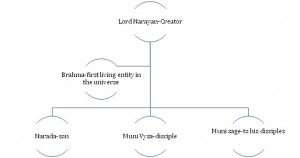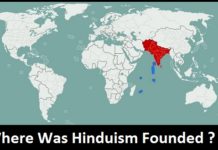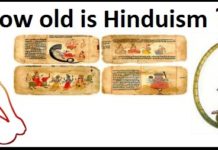dharman tu sakshad bhagavat pranitam
It was the creator (whom we call God) created dharma. In every cycle (yug) the Avatar manifests or incarnates on earth. If we delve back on the Vedic scriptures it is easy to find that it is dharma, which has taken root. The descendants fall in line as the Lord teaches the scriptures to the first Universal entity Brahma.
It is said that in each cycle (yuga) the Lord will incarnate and bring back dharma and its principles to the living beings on earth.
Lord Krishna has said in the Bhagvat Gita:
yada yada hi dharmasya
glanir bhavati bharata
abhyutthanam adharmasya
tadatmanam srijamy aham
(Bhagavad Gita 4.7)
“Whenever and wherever there is a decline in religious practice, O descendant of Bharata, and a predominant rise of irreligion – at that time I descend myself to reestablish it.”
Each guru has been a shisya and then after learning teaches the next. This way the guru-shisya parmapara holds the tenets of Hinduism. Many rishis and munis have become important and have shaped the thinking of their disciples. The same knowledge of the scriptures has been taught from one guru to a shisya. This is adherence to the Vedic system and there can be no founder but all are disciples. The concept of Dharma is not man made and is celestial. The Creator’s instructions dharman tu sakshad bhagavat pranitam are to be followed.
Who is the founder of Hinduism?
Truth is stranger than fiction. The world’s oldest faith Hinduism has no founder-This is the plain truth. While other religions have founders who are followed, people of Hindu faith have no founder to look up to. It was never a religion in the first place! It was the cultural norm that took shape into a way of living for a civilization on the banks of the Indus Valley. Many people will continue to ask who is the founder of Hinduism. And the faithful will continue to say that this faith is a cosmic blend of scripture teachings of the Vedas, traditions and customs to awaken the dormant soul of human beings. In the absence of any leader, or founder billions of people still follow the faith. What makes Hinduism move on?
Also Read : Hinduism Origins and Beliefs
Sacred texts still revered as the final word!
There is a very rich cumulative series of sacred texts written in Sanskrit that have played a very significant part in making people believe in this faith. Along with the written word, the arts and visual forms have also contributed to making it dominant from the Indus Valley civilization period.
Today, Hinduism has a large presence in entire South East Asia and is know worldwide. Early scholars coined the word ‘Hinduism’ because it was dominant in the Indian sub-continent. The earliest Greek visitors to the country called it ‘Indoi’. It was in the 16th century that the word ‘Hindu; became more frequent by the natives. The overseas merchants still categorized the group of people more as religious rather than give it a regional, cultural or ethnic or even a geographical connotation. For most Hindus they prefer to call it a Vedic religion as they follow the Vedas and its teachings. It is often referred to as ‘Sanatan Dharma’ or eternal law.
The founding principles that have developed through various millennia break the followers as:
- Vedic period
- Challenge to Brahmanism
- Hinduism under Islamic rule
- Sacred texts and philosophical literature
- Practical Hinduism in the 21st century
- Rituals and common social practices
- Institutions &cultural representation
- Hinduism beyond India through Indian diaspora
What makes Hinduism differ from other faiths?
- It does no have founders as in case of Christianity, Islam Sikhism, Buddhism, and Judaism.
- There is no concept of a single deity or a Holy text
- Not one method of morality
- No central religious authority
- No concept of Prophet or God
- Freedom of interpretation of the sacred texts
- Religious tolerance
How the faith has survived for centuries?
Many cultures have emerged and then vanished all over the world. But Hinduism has survived. There are many reasons why it is still thriving and people across the world are converting on their own. On the surface what makes it thrive is its practical nature towards humanity and approach to live & death. Once the misconceptions are removed, it is clear that this faith endures more and awakens one to true spirit. Since there are many Hindus in India it is also called as Hindustan. But there are practicing Hindus in Nepal, Sri Lanka, Fiji also. The Indian diaspora that has migrated to UK, USA and Europe, South Africa and many other places in the world have also contributed to its spread. From ancient times i.e. Vedic times the faith has evolved and continues to do so. The word Hinduism has not meaning. It was a word coined by the foreigners who entered the country as merchants. Armed forces of Portuguese, Dutch and British also settled in the country and made ‘Hinduism’ a common name.
Worshiping factors
Most Hindus believe there is one God or ‘Brahman’. Those who worship several deities consider them as the manifestation of the Brahman. The deities are in human form. But Hindus also consider mountains, rivers and temples to be sacred. Several trees and animals are also considered sacred. The cow is considered the holiest of all animals and is called gau mata (mother).
Temples and shrines (natural formations of stones) are considered places of worship and have existed for many centuries. There are many rituals and rites involved in worship. There are distinct Vaishnavism, Shivism and Shakti worship. They are worshipped so that the Hindu leads the right kind of life and follows the correct path to salvation.
The aim of every Hindu is focused on dharma (right way of living), arth (right way of earning wealth), kama (right desires) moksh (liberation or salvation. Generations of Hindus have adhered to these four goals of life. These four goals are important in all the four stages of life called, Bhramacharya (life as student), Gristhashram (family life) Vanasprathashram (leaving home and family), and Sanyasashram (discard all links with material life and connect to spirituality).
Other aspects of Hinduism that have emerged
It is not just the way of life that ‘Hinduism’ has contributed to the world. Along with it, there are various significant things that have emerged as valuable assets to human life. The rest of the world has hailed the potent force often as they discover the hidden gems. Yoga, Ayurveda, Meditation, Pranayama and even Vegetarianism have been Hindu-centric! Now even the rest of the world is looking at them in a new light and reacting to them positively. The other secret traditions that have also unfolded include, palmistry, tantra, mantra Jap, astrology, martial arts, Vastu, mathematical decimal system and Zero.
Hinduism is the reason for the existence of Buddhism, Jainism and Sikhism.
Who is a pure Hindu?
Despite the fact that there is no single founder of Hinduism, it is remarkable that followers of this faith continue with the precepts and traditions from Vedic times. Right from those days, till today a Hindu will follow:
- Ahimsa (non-violence)
- Path of Satya (truth
- Asteya (not to steal or rob)
- Remain a bhramacharya (good thoughts, words, and deeds) It also means there will be no promiscuity and extra marital affairs.
- Kshama (forgiveness)
- Dhriti (Be steadfast and focused in every stage of life)
- Daya (show compassion)
- Arjaya (remain honest life long)
Hindu philosophy
Those who follow this faith do so as per the Vedic traditions.
If you ask a practicing Hindu today he would say, “Hinduism is the Oldest and Greatest Religion in the world wherein Dharma and Adharma are clearly defined so that people could easily identify them when they have to follow up one out of the two. Most people following Hinduism knows very well what are the dharmic (not harming anyone even by thought) activities and follow them up very easily so that they could attain a good life of peace and prosperity and also their grandchildren in that row.
Hinduism also has lot of good things in it like yoga, meditation, medication, living good styles, harmless foods, natural cooking systems and eating systems.
Its general humane theme is HELP EVER HURT NEVER, which is helping people in India to align themselves with other people from other religions united.
The Hindu Undivided Family system is a system wherein the entire family of a man starting from him till his 4th generation grand children are all live together in the same family or house or village with uniform thoughts and actions and act as a helping in bringing up children and even big ones in the family in good thoughts and activities which will help them as well as the society in various ways.
HINDUISM IS LIVING A DIVINE LIFE NOTHING ELSE.”
Practical Hinduism as practiced by diaspora & world
Ekam sat vipra bahudha vadanti
Major religions like Christianity, Judaism and Islam have spread all over the world. Preachers have emphasized on the teachings of the leaders. But there have been no preachers of Hinduism that can spread the faith. So how has it gone beyond the shores of ‘Hindustan’? It is the Indian Diaspora who has taken their faith along with them wherever their fortunes have taken them. It is these people who have settled as PIOs and created a base for more people to be introduced to the Hindu philosophy. Other than them as travel soared imminent Hindus like Swami Vivekanand took the world by storm. Since then a series of Hindu philosophers, gurus and scholars have been instrumental in spreading the tenets of the faith. Indians who migrated to East Africa, Britain, US took with them their traditions and rituals. That’s how the subsequent generations have continued in the footsteps of their elders.
Conclusion-Who is founder of Hinduism?
Perhaps no other religion in the world, other than Hinduism has been so open to interpretation or searched for logical conclusions about its founder. It can be said that it leads to several paths of wisdom that are based on logical reasoning by the human mind. There is no divine authority that can lay claim to its teachings. Located in the ancient river belts of the Indus Valley, the Vedic society was established as Dharma. Thinkers propagated new philosophies. The same shall continue





